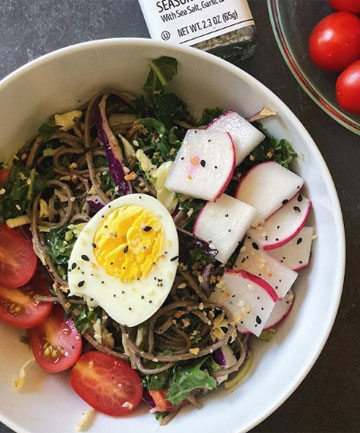This fat-focused diet breaks down to about 75% fat, 20% protein and 5% carbohydrates. "The overall goal is to push your body into making ketone bodies as an energy source, this is called ketosis," explains Sarah Morgan, founder of Buddies in My Belly. Basically, this means that your body is burning fat (rather than carbs) for fuel.
Pros: "Gets people off sugar and simple carbohydrates that tend to dominate the standard American diet," says Morgan.
Cons: "Two to four pounds of your weight is made up of friendly, health-promoting bacteria that live in your digestive tract," says Morgan. "This bacteria depends upon fiber for fuel — any diet that limits fiber intake has the potential to shrink their number and backfire on your weight loss goals." Keto is low on fiber because it severely restricts carbohydrates (fiber is the indigestible part of a carb). "Another important point to consider: we are not designed to consume large amounts of fat. It can spike cholesterol levels, lead to fatty liver disease and even osteoporosis."
Image via @hannahs_health_journey2018
Pros: "Gets people off sugar and simple carbohydrates that tend to dominate the standard American diet," says Morgan.
Cons: "Two to four pounds of your weight is made up of friendly, health-promoting bacteria that live in your digestive tract," says Morgan. "This bacteria depends upon fiber for fuel — any diet that limits fiber intake has the potential to shrink their number and backfire on your weight loss goals." Keto is low on fiber because it severely restricts carbohydrates (fiber is the indigestible part of a carb). "Another important point to consider: we are not designed to consume large amounts of fat. It can spike cholesterol levels, lead to fatty liver disease and even osteoporosis."
Image via @hannahs_health_journey2018
"Its premise is that we've adapted to eating particular kinds of foods, including meat and other animal products like bone marrow, fats and plant-based foods and, only recently (in the last 10,000 years), the agricultural revolution introduced unnatural food sources, including grains with gluten, animal products (milk, cheese, etc.), white refined sugar, synthetic trans-fats (partially hydrogenated fats) and packaged foods with additives and glow-in-the-dark chemicals," explains Dr. Robert Zembroski, specialist in functional medicine, clinical nutritionist and author of REBUILD. The idea here is to go back to how caveman ate.
Pros: "It promotes the consumption of whole, nutrient-dense foods, including lean meats, wild-caught seafood, healthful fats, oils, fruits, vegetables and starchy root vegetables," says Zembroski. "Eating the way our ancestors did will reduce body fat and normalize blood sugar, glucose tolerance and blood fats and Paleo eating has made us more aware of the dangers of processed foods."
Cons: "There's conflicting information on the evidence behind the exclusion of legumes and grains," says Zembroski. "The complete elimination of grains means decreased fiber in the diet, which may cause deleterious results to the gut flora (bacteria)."
Image via @paleogrubs
Pros: "It promotes the consumption of whole, nutrient-dense foods, including lean meats, wild-caught seafood, healthful fats, oils, fruits, vegetables and starchy root vegetables," says Zembroski. "Eating the way our ancestors did will reduce body fat and normalize blood sugar, glucose tolerance and blood fats and Paleo eating has made us more aware of the dangers of processed foods."
Cons: "There's conflicting information on the evidence behind the exclusion of legumes and grains," says Zembroski. "The complete elimination of grains means decreased fiber in the diet, which may cause deleterious results to the gut flora (bacteria)."
Image via @paleogrubs
A mostly plant-based diet — no meat, seafood or poultry.
Pros: "A diet heavy in plant-based foods provides essential micronutrients and phytochemicals known to prevent disease and allow someone to rebuild from disease," Zembroski says. "Deciding on a vegetarian lifestyle can result in becoming more mindful about eliminating processed foods and increasing exercise."
Cons: If you decide to go vegetarian and you are not eating meat, you have to be very conscious about what you're eating to make sure you're getting all the essential nutrients. "Rice and beans are very important in order to get all the essential amino acids from plant-based proteins," Zembroski says. "Many people who avoid meats also seem to overconsume packaged, sugar-laden foods, pastas and other processed inflammatory foods. Vegetarians can also become B12-deficient, creating the symptoms and presentation of pernicious anemia — abnormal size and shape of red blood cells, peripheral neuropathies and brain fog."
Image via @trailmixforthesole
Pros: "A diet heavy in plant-based foods provides essential micronutrients and phytochemicals known to prevent disease and allow someone to rebuild from disease," Zembroski says. "Deciding on a vegetarian lifestyle can result in becoming more mindful about eliminating processed foods and increasing exercise."
Cons: If you decide to go vegetarian and you are not eating meat, you have to be very conscious about what you're eating to make sure you're getting all the essential nutrients. "Rice and beans are very important in order to get all the essential amino acids from plant-based proteins," Zembroski says. "Many people who avoid meats also seem to overconsume packaged, sugar-laden foods, pastas and other processed inflammatory foods. Vegetarians can also become B12-deficient, creating the symptoms and presentation of pernicious anemia — abnormal size and shape of red blood cells, peripheral neuropathies and brain fog."
Image via @trailmixforthesole
This diet eliminates all animal foods and anything cooked over 118 °F.
Pros: "Weight loss and improved health — most people who follow the plan consume only half the calories they would eat on a cooked diet," says nutritionist and holistic health coach Jennifer Silverman. She also notes that it's environmentally conscious, packed with natural enzymes and nutrients that help the body reach optimal health and that it encourages people to stay away from processed, microwaved, irradiated, genetically engineered foods. "With some foods, cooking above 118 degrees obliterates most of the vitamins, minerals and nearly all of the immune-boosting phytonutrients," she says.
Cons: "A raw vegan diet excludes important and essential nutrients found in healthful meats, seafood and eggs," says Zembroski. "The major cause of chronic health issues and disease is nutrient deficiency. By eliminating a healthful source of food like muscle tissue from animals, this diet lacks calcium, omega-3 fatty acids, folate and vitamin B12, which increases the risk of developing anemia, hormone imbalances and muscle atrophy." He goes on to note that a raw vegan diet can lead to bloating and gas, as cooking vegetables helps break them down for easier digestion. "Cooking vegetables also helps the release of nutrients like lycopene from tomatoes — so not all are better in a raw state," he adds.
Image via @115degreesraw
Pros: "Weight loss and improved health — most people who follow the plan consume only half the calories they would eat on a cooked diet," says nutritionist and holistic health coach Jennifer Silverman. She also notes that it's environmentally conscious, packed with natural enzymes and nutrients that help the body reach optimal health and that it encourages people to stay away from processed, microwaved, irradiated, genetically engineered foods. "With some foods, cooking above 118 degrees obliterates most of the vitamins, minerals and nearly all of the immune-boosting phytonutrients," she says.
Cons: "A raw vegan diet excludes important and essential nutrients found in healthful meats, seafood and eggs," says Zembroski. "The major cause of chronic health issues and disease is nutrient deficiency. By eliminating a healthful source of food like muscle tissue from animals, this diet lacks calcium, omega-3 fatty acids, folate and vitamin B12, which increases the risk of developing anemia, hormone imbalances and muscle atrophy." He goes on to note that a raw vegan diet can lead to bloating and gas, as cooking vegetables helps break them down for easier digestion. "Cooking vegetables also helps the release of nutrients like lycopene from tomatoes — so not all are better in a raw state," he adds.
Image via @115degreesraw
A high-protein, low- to no-carb diet. "With time, the Atkins concept of eating all the meat and eggs you can consume while eliminating most, if not all, carbs has evolved into a less regimented plan," notes Zembroski. "The newer Atkins plan now includes eating some complex carbs while eliminating all refined and simple carbohydrates such as white bread and pasta.
Pros: It may help improve blood sugar and triglyceride levels, according to Terra's Kitchen nutritionist, Dr. Lisa Davis, PhD, PA-C, CNS. It can also help you lose weight fast. "There are two major reasons: One, a reduction of simple carbohydrates causes the reduction of water stored in tissues. A gallon of water lost is equivalent to 8 pounds. Two, the reduction in the circulating levels of insulin — the master fat-storage hormone. Simple sugars cause elevation in blood sugar and insulin levels which will take any excessive unused energy and store it as fat," Davis says. She also notes that, despite the higher protein and fat intake, the Atkins diet can help reduce long-term blood-sugar problems.
Cons: "It tends to be higher in saturated fat and cholesterol due to larger intake of animal products and can be very low in dietary fiber due to avoidance of high fiber plant foods," says Davis. People are "afraid" of carbs — vegetables are carbs! You should question the long-term viability of any diet that tells you to limit your vegetable intake. "Atkins also prohibits certain antioxidant- and nutrient-dense foods like fruit, whole grains and legumes because of higher carbohydrate content," says Davis. Zembroski adds that some people suffer from severe constipation. "The elimination of soluble and insoluble fiber can alter the gut bacteria and reduce gut motility, causing poor elimination." Moreover, he notes, some people can't and don't discern between a healthful grass-fed protein source and processed meats and meat by-products. Processed meats and their additives and chemicals increase the risk for chronic disease. "The Atkins diet also offers snack bars and meal replacements, which are loaded with artificial sweeteners and flavors," Zebroski says.
Image via @ketomena
Pros: It may help improve blood sugar and triglyceride levels, according to Terra's Kitchen nutritionist, Dr. Lisa Davis, PhD, PA-C, CNS. It can also help you lose weight fast. "There are two major reasons: One, a reduction of simple carbohydrates causes the reduction of water stored in tissues. A gallon of water lost is equivalent to 8 pounds. Two, the reduction in the circulating levels of insulin — the master fat-storage hormone. Simple sugars cause elevation in blood sugar and insulin levels which will take any excessive unused energy and store it as fat," Davis says. She also notes that, despite the higher protein and fat intake, the Atkins diet can help reduce long-term blood-sugar problems.
Cons: "It tends to be higher in saturated fat and cholesterol due to larger intake of animal products and can be very low in dietary fiber due to avoidance of high fiber plant foods," says Davis. People are "afraid" of carbs — vegetables are carbs! You should question the long-term viability of any diet that tells you to limit your vegetable intake. "Atkins also prohibits certain antioxidant- and nutrient-dense foods like fruit, whole grains and legumes because of higher carbohydrate content," says Davis. Zembroski adds that some people suffer from severe constipation. "The elimination of soluble and insoluble fiber can alter the gut bacteria and reduce gut motility, causing poor elimination." Moreover, he notes, some people can't and don't discern between a healthful grass-fed protein source and processed meats and meat by-products. Processed meats and their additives and chemicals increase the risk for chronic disease. "The Atkins diet also offers snack bars and meal replacements, which are loaded with artificial sweeteners and flavors," Zebroski says.
Image via @ketomena








